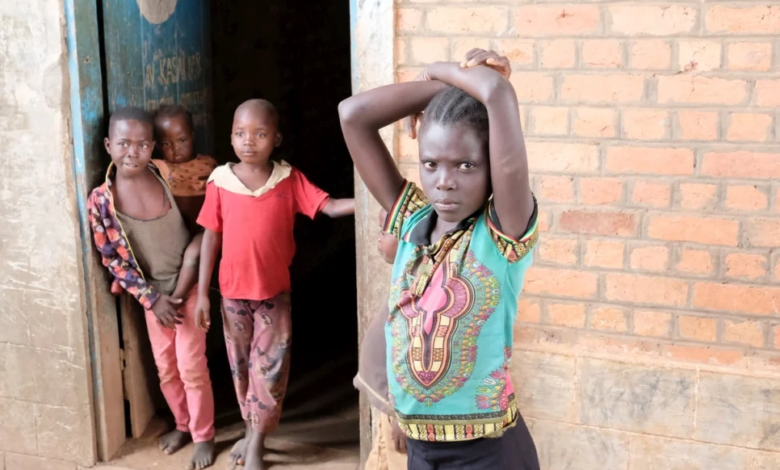Students Protest As Ongoing Conflict Prevents DR Congo Schools From Resuming
The occupation of schools by displaced people, who say they have nowhere else to go, has also hindered academic activities to proceed as scheduled.

Several schools in the eastern Democratic Republic of Congo did not reopen as scheduled yesterday, Sept. 5, as many students instead demonstrated on the streets.
The protesters in the Rutshuru territory of North Kivu called on the government to send troops to liberate their campuses occupied by M23 rebels, and others called on displaced children occupying their schools to leave.
According to Jean Claude Mbabanze, president of the Rutshuru civil society, the displaced children want to return to their villages to be able to start school.
Schools did not reopen yesterday in Bunagana and several villages which have for over three months now been occupied by M23 rebels.
“The children of displaced persons are protesting to demand that the DR Congo national army, FARDC, should perform its duty and liberate their schools so that they can return to their villages and go to school. They have been gathering at the office of the administrator of Rutshuru Centre and others at the office of the Bwisha chiefdom, while others have been raiding schools where classes are going on to force their colleagues to join them,” he said.
“Schools have not reopened in Bunagana and other zones occupied by the M23 rebels because for classes to reopen, there must be teachers, principals of schools and students, but all these people are displaced. There is no school equipment even. All that we are asking for is the liberation of Bunagana and all the other areas occupied by the enemy.”
On the ground, the war goes on though the army and the M23 seem to be observing a truce while the population is calling on the FARDC to liberate the zones occupied by the rebels.
The military administrator of Rutshuru territory, Colonel Bakole Nyengele Luc Albert, says necessary steps have been taken to enable displaced children to return to school while waiting for the complete liberation of their areas.
“They came here to demand that they return to their homes.” the military governor said.
“As parents, we must find an urgent solution while waiting for the normalisation of the situation and surely things will normalise.
“In the meantime, the children and their teachers are here. They are all displaced persons here. We must find a solution. There are still classrooms that are occupied by displaced persons, but in other schools, classes have resumed. While waiting, we have already constructed some shelters. Non-governmental organisations are constructing other shelters. The army is also doing its job. Once the army finishes its work, they – displaced persons and their children – will calmly return to their homes.”
The M23 rebels have for the past three months been occupying the town of Bunagana on the border with Uganda. It has already installed its local administrative offices among the population, most of whom have returned to their homes, braving any possible maltreatment by the rebels because life, where they were taking refuge, was unbearable.
In a related development, schools in some areas of Rutshuru territory are unable to reopen because their campuses have been occupied by displaced persons escaping from war.
Displaced persons and their children carrying batons and other local weapons erected barriers at school entrances to prevent children from having access to their classrooms.
“It is here we have been living because we have nowhere else to go. This classroom is our house. Now they want to chase us away from here to go to where? We do not want to sleep in the open air. We are displaced persons because of the war,” pleaded Fabiola Nyarahabwa, one of the displaced persons.
“President Felix Tshisekedi and all his parliamentarians are there because they went to school. We are calling for Bunagana and our villages to be liberated so that our children can also return to school,” declared Elizabeth, a leader of the displaced persons in a stadium hosting over 453 displaced households.
Inside the classrooms of Rugabo school, as well as other schools, desks have been completely destroyed and are being used as poles for mosquito nets and also serve as demarcation tools between spaces considered sleeping rooms for displaced persons and their families.
“We are studying the possibilities of how the students of Rutshuru Centre can study before midday while the displaced students study in the afternoon,” explained Luc Bakole Nyengeke, military administrator of Rutshuru territory.
Bakole acknowledged the difficulties the displaced persons face in quitting the classrooms during the day for classes to be held.
“The sustainable solution is to ask the Congolese government to end this war so that we can return to our villages and allow our children to study because all children have the same rights and our own also have the right to education,” said Alexis Senga, a displaced person.
The Congolese army and the United Nations Blue Helmets have been clashing with the M23 rebels who were defeated in 2013 but have resurfaced since last year and the DR Congo government accuses Rwanda of supporting them.
The eastern Democratic Republic of Congo has been gripped by violence for the past thirty years due to the presence of more than one hundred armed groups that have been wrecking havoc on the populations.
Support Our Journalism
There are millions of ordinary people affected by conflict in Africa whose stories are missing in the mainstream media. HumAngle is determined to tell those challenging and under-reported stories, hoping that the people impacted by these conflicts will find the safety and security they deserve.
To ensure that we continue to provide public service coverage, we have a small favour to ask you. We want you to be part of our journalistic endeavour by contributing a token to us.
Your donation will further promote a robust, free, and independent media.
Donate HereStay Closer To The Stories That Matter




